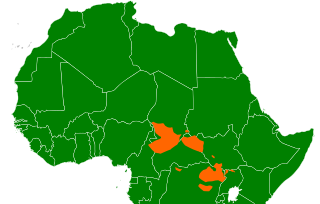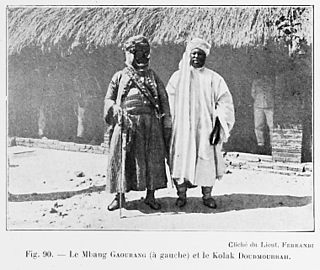Bagirmi is the language of the Baguirmi people of Chad, belonging to the Nilo-Saharan family. It was spoken by 44,761 people in 1993, mainly in the Chari-Baguirmi Region, as well as in Mokofi sub-prefecture of Guéra Region. It was the language of the Kingdom of Baguirmi.
The Fer language, also Dam Fer or Fertit, one of several languages called Kara, is a Central Sudanic language spoken by some five thousand people in the northern Central African Republic near the Sudanese and Chadian borders, in the region known as Dar Runga.

The Sultanate or Kingdom of Bagirmi or Baghermi was a kingdom and Islamic sultanate southeast of Lake Chad in central Africa. It was founded in either 1480 or 1522 and lasted until 1897, when it became a French protectorate. Its capital was Massenya, north of the Chari River and close to the border to modern Cameroon. The kings wore the title Mbang.

Central Sudanic is a family of about sixty languages that have been included in the proposed Nilo-Saharan language family. Central Sudanic languages are spoken in the Central African Republic, Chad, South Sudan, Uganda, Congo (DRC), Nigeria and Cameroon. They include the pygmy languages Efé and Asoa.

The Sara people are a Central Sudanic ethnic group native to southern Chad, the northwestern areas of the Central African Republic, and the southern border of North Sudan. They speak the Sara languages which are a part of the Central Sudanic language family. They are also the largest ethnic group in Chad.
Baguirmi is a department of Chad, one of three in the Chari-Baguirmi Region. It takes its name from the kingdom of Baguirmi. Its capital is Massenya.

Chad has two official languages, Arabic and French, and over 120 indigenous languages. A vernacular version of Arabic, Chadian Arabic, is a lingua franca and the language of commerce, spoken by 40-60% of the population. The two official languages have fewer speakers than Chadian Arabic. Standard Arabic is spoken by around 615,000 speakers. French is widely spoken in the main cities such as N'Djamena and by most men in the south of the country. Most schooling is in French. The language with the most first-language speakers is probably Ngambay, with around one million speakers.
Sara language may refer to:
The Bongo–Bagirmi or Sara–Bongo–Bagirmi languages are the major branch of the Central Sudanic language family with about forty languages. Principal groups include Bagirmi languages such as Naba and the Sara languages. They are spoken across CAR, Chad, South Sudan, and adjacent countries.
The Bagirmi languages comprise half a dozen languages spoken in southern Chad. They are members of the Central Sudanic language family.
Doba is a Central Sudanic language of Chad. It is traditionally considered three languages, because it is spoken by three ethnicities with separate identities, the Bedjond, the Mango, and the Gor. However, all have a high degree of mutual intelligibility, and so by that standard are a single language.
Shemya is the language of the Sinyar people. It is a Central Sudanic language spoken in Chad and formerly in Darfur, Sudan. It is variously spelled Shamya, Shamyan, Shemya, Sinya, and known as Symiarta, Taar Shamyan, Zimirra.
Gulay is a Bongo–Bagirmi language of Chad. An eighth of speakers are Pen (Peni), and do not like to be called Gulay.
Kaba (Kabba), or Kabba of Goré, is a language of the Sara people in Central African Republic and Chad, with around 100,000 speakers.
Mbay, or Sara Mbay, is a Bongo–Bagirmi language of Chad and the Central African Republic.
Ngam, or Sara Ngam, is a Bongo–Bagirmi language of Chad and the Central African Republic.
Sar or Sara, also known as Madjingay and Sara Madjingay is a Bongo–Bagirmi language of southern Chad, and the lingua franca of regional capital of Sarh.
Beraku is an extinct Bongo–Bagirmi language of Chad. Speakers have shifted to Chadian Arabic or various Kotoko languages.
Gula is a Bongo–Bagirmi language of Chad.

Abd ar-Rahman Gaourang II was Mbang of Bagirmi from 1885 to 1918. He came to power at a time when the sultanate was in terminal decline, subject to both Wadai and Bornu. The Sudanese warlord Rabih az-Zubayr made him his vassal in 1893. Gaourang signed a treaty that made his sultanate a French protectorate in 1897. After the final defeat of Rabih in 1900 he ruled as a subordinate of the French in Chad until his death in 1918.